Dissecting House debate: Millions of words, six key files.
What MPs have talked about since the election. Our analysis —and why words matter
The Peace Tower is seen on Parliament Hill in Ottawa on Tuesday, November 5, 2013. THE CANADIAN PRESS/Sean Kilpatrick
Share
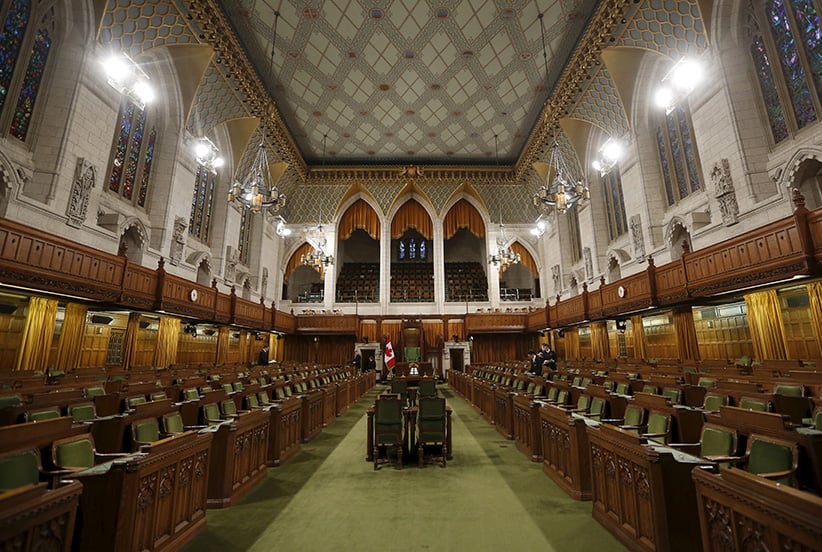
You can learn a lot about a politician by reading Hansard, the official transcript of parliamentary debate. You find out who talks the most and who barely utters a word, which priorities occupy Parliament’s time and which don’t, and how politicians use words that suit their worldview, their opposition be damned. As Ottawa’s summer break comes to an end, Maclean’s dissected every word spoken in the House of Commons since the last election. That’s 75 sittings and counting, and millions of words on the record.
Even a basic search of Hansard quickly reveals trends. Search the term “middle class,” a key rhetorical pillar of the Liberal platform and the voter demographic treasured by every political party. No surprise that on Feb. 1, when the House debated a Liberal tax cut for middle-income families in the form of Bill C-2, the governing party said “middle class” aloud 154 times. On the same day, Conservatives repeated the words 64 times, and the NDP 76 times. When the bill again came up for debate on March 7, Tories embraced the opportunity to meet Liberal rhetoric with their own. That day, mentions of Tax-Free Savings Accounts spiked. TFSAs are one of the enduring legacies of the late Jim Flaherty, the longtime finance minister who first championed the measure eight years prior. (C-2 also halved the allowable annual contribution to TFSAs, a Liberal campaign promise the Tories opposed vehemently.)
As Ottawa prepares for an autumnal dose of parliamentary debate, we’ve harnessed the power of Hansard to explore some of the issues that dominated last winter and spring—and the key phrases that drove the conversation on six key files. Open Parliament’s Michael Mulley deserves a shout out. His analysis, combined with the brilliant OpenParliament.ca (which we reference repeatedly), gave life to this project.
On the issues, we’ll start with electoral reform, a sleeper issue during the election that produced daily showdowns in the House between Conservative MP Scott Reid and Democratic Institutions Minister Maryam Monsef.
1. Electoral reform
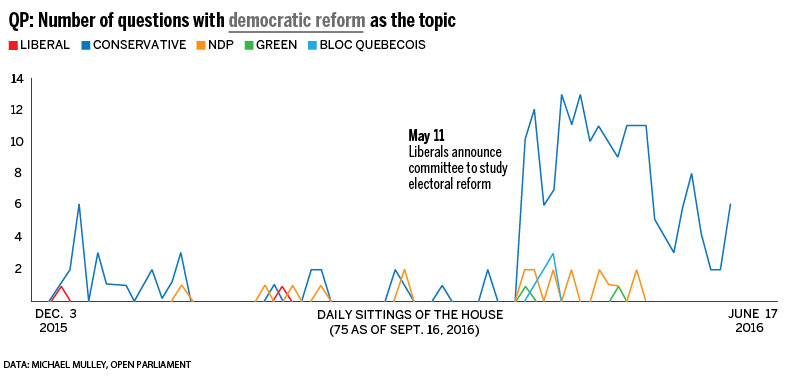
It was clear from the very first question period on Dec. 7, 2015, when Reid emerged as the tenacious Tory critic for democratic institutions, that he and Monsef would see each other every day, but almost never see eye to eye. That small, early spike on QP questions related to democratic reform represents those first exchanges. Reid asserted that the Liberal speech from the throne, delivered a few days prior, which promised to introduce a new voting system, was no less than “anti-democratic.”
A cheery Monsef, ensconced in sunny ways orthodoxy, stuck to her lines and promised, with practiced gravitas, that a new electoral system would “change the history of this nation’s democracy.”
After that brief flurry of questions in the parliamentary session’s early days, Monsef faced far less bluster until May 11, when the Liberals announced a special committee on electoral reform. Much as NDP critic Nathan Cullen was pleased to see some movement on the file, he complained that the announcement was “tainted with some disappointments.” The Liberal proposal gave the governing party a majority of committee votes, which Cullen called a “false majority” that would “stack the decks.”
That’s when Conservatives set out in earnest to derail the government’s plans, devoting 10 of their first 11 questions that day to electoral reform. They didn’t much bother to be constructive. Said MP Alain Rayes: “This is just the first day of the discussion on the Liberal’s democratic reform, and it is already clear that the Liberals have no interest in really listening to Canadians.” The tail end of Rayes’s question continued a trend started by Reid back in December: a call for a referendum on voting reform.
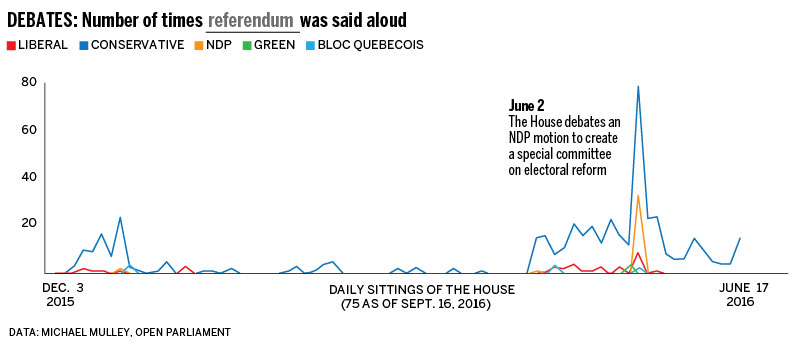
Calls for a referendum didn’t spike on May 11, however. If we calculate the number of times the word referendum was spoken aloud in the Commons, unofficial Referendum Day came on June 2. That day, the NDP tabled a motion to modify the Liberal special committee by reducing Liberals to a minority and inviting the Bloc and Green parties to the table.
Liberals acceded to that demand, and ended up voting for the proposed changes. Conservatives pushed relentlessly for a referendum, and MPs said that word dozens of times during House debate on the matter. Reid & co. surely won’t relent this fall, so expect similar trend lines whenever electoral reform threatens to make the news.
2. Indigenous affairs
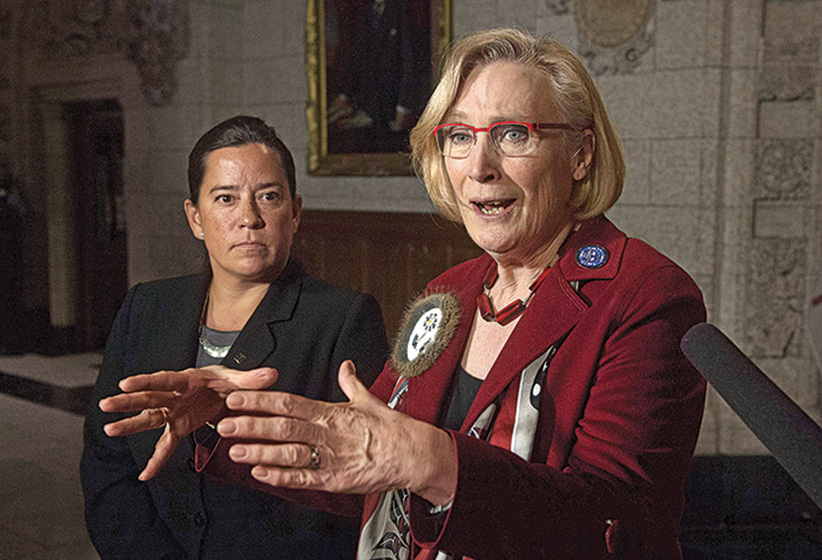
In the House of Commons, Liberals have proven far more eager than their Conservative predecessors to talk proactively about Indigenous people in Canada. Whether or not meaningful policy or programs emerge from all the words, Trudeau and his ministers are not reticent on a file that Canadians are confronting in the aftermath of the Truth and Reconciliation Commission‘s final report.
From the session’s first days last December, the conversation about Indigenous affairs appeared more conciliatory than only a few months earlier. Witness the first question period exchange between NDP MP Charlie Angus – whose riding includes a troubling number of Indigenous communities in distress – and Indigenous Affairs Minister Carolyn Bennett. Angus was “heartened” by Bennett’s language, and Bennett thanked Angus for “all of his hard work” across Canada.
Indigenous issues consistently arose in question period through to the end of spring. On only a handful of days were they absent entirely from opposition questions. New Democrats, whom Conservatives outnumber by more than 2:1 in the Commons, typically made Indigenous affairs a greater priority during QP.
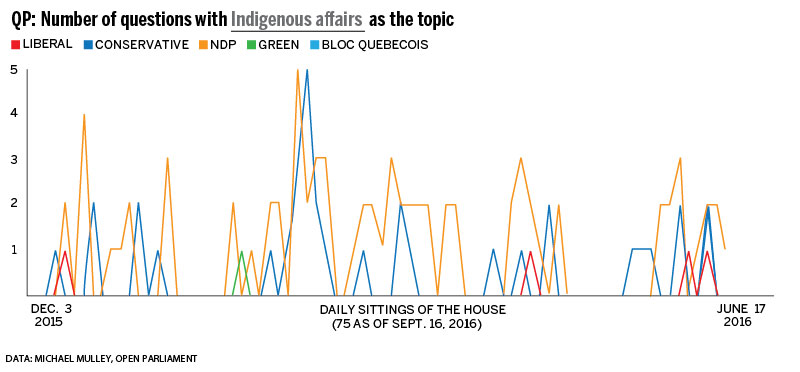
The word Indigenous has only come to prominence in the House of Commons in recent years. In 2015, Indigenous appeared 389 times in Hansard. In the same year, Aboriginal appeared 1,530 times. A new government, and new preferred phrasing, have had a significant effect after just 75 sittings. So far this year, MPs spoke Aboriginal aloud 859 times in Hansard and Indigenous 1,833 times.
The responsible minister, Bennett, now has Indigenous in her title. In May, Bennett and Justice Minister Jody Wilson-Raybould launched a public inquiry into missing and murdered Indigenous women. As parliamentarians make reference to the minister and her work, and journalists follow, the conversation changes. It may sound like only a different word, but that conversation in Ottawa is actually part of a much larger conversation.
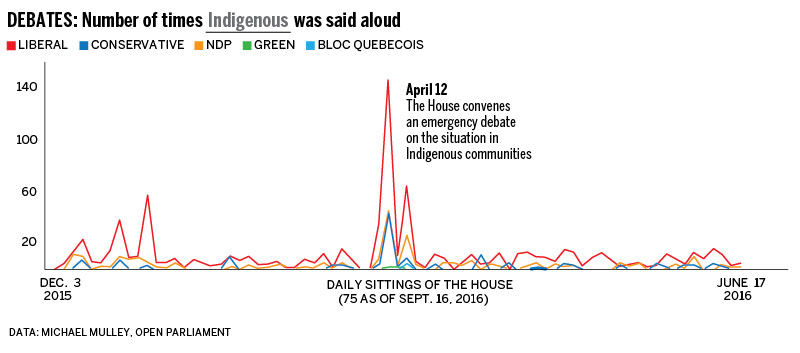
We charted the use of the word Indigenous across the parliamentary session, and the clearly visible jump marks the evening of the House’s emergency debate on the situation in Indigenous communities in Canada. On April 12, police in troubled Attawapiskat, Ont., broke up a suicide pact that drew into sharp focus a suicide crisis in that community (and others across Canada).
Anthony Rota, the assistant deputy speaker, opened that debate at 6:35 p.m. Dozens of MPs participated in a passionate conversation that ended at midnight, when deputy speaker Bruce Stanton adjourned the chamber for the night. That spike proved Indigenous issues can, if rarely, dominate the House’s agenda.
3. Environment and climate change
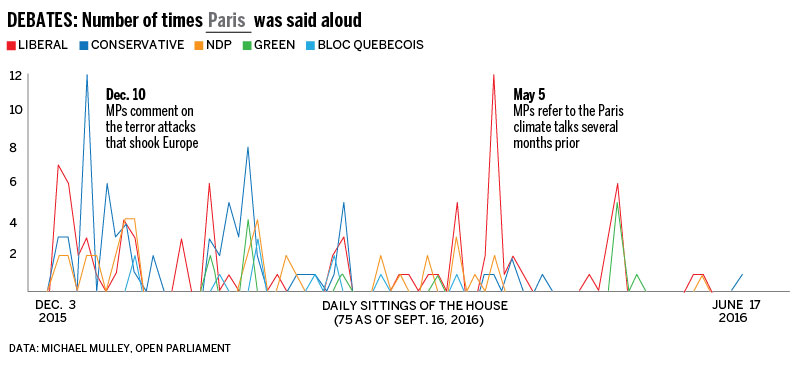
Liberals rode to power on the promise of bold action to address climate change by setting a price on carbon, ultimately reducing carbon emissions, and delivering for voters who care about the environment. To be sure, there was mention of all of those things in the House of Commons between the last election and the summer break. Environment was uttered aloud 1,194 times, climate came up 849 times, someone mentioned carbon 371 times, emissions 265 times, and greenhouse 207 times.
Amid all the negotiations on a national carbon price that saw Prime Minister Justin Trudeau and Environment and Climate Change Minister Catherine McKenna meet with provincial counterparts, there was one big metaphor for climate change that found its home in the House: Paris. The French metropolis hosted the UN Climate Change Conference in December, and the city followed climate treaty tradition by, shortly after, sharing an association with the fight against global warming (Kyoto and Copenhagen are other modern examples).
Of course, Paris didn’t make headlines for climate talks alone. The month before, Paris was hit by a devastating terror attack that fuelled a Conservative appeal in the Commons for a sustained military response to ISIS. House debate reflects the arresting notion that one city could, within a few weeks, serve as a backdrop for two significant global challenges the new Liberal government was forced to confront almost immediately after taking power.
As of the end of the summer, the Liberals have no national agreement on a carbon price and no new emissions reductions targets—though The Globe and Mail reported on Sept. 18 that the feds will impose a price on provinces that don’t play ball. The opposition will chide the Liberals for sticking to the former Conservative status quo on emissions targets after making so many lofty promises.
4. The economy
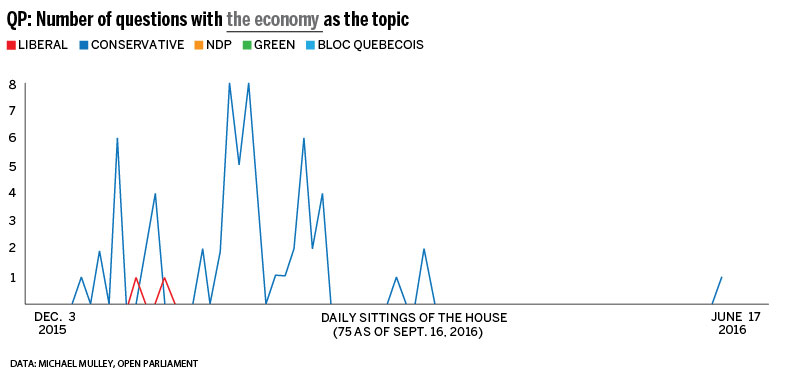
If there’s one thing you can bet about the House of Commons, it’s that the folks we elect to serve in the chamber will disagree about the economy—even in good times. These days, as Canada’s economic recovery is hampered by long-term demographic trends, no party’s solution looks the same. Add to that broken Liberal promises to cap deficits and set a hard deadline on achieving a balanced budget, and promises kept on targeted tax cuts and expensive child benefits, and nary a day passes without an argument about basic economics.
Interim leader Rona Ambrose tapped former transport minister Lisa Raitt to, shall we say, challenge the wisdom of Finance Minister Bill Morneau’s campaign promises. Fresh from cabinet and experienced in the House, Raitt offered up some idle questions to Morneau early during that first question period on Dec.7. Namely: “How much will these broken promises cost Canadians?”
Conservatives ask the most questions on the economy, according to Hansard’s judgment of what constitutes a question on that topic. But a closer look at keywords on economic issues reveal the different ways in which each party gets at what they think should be the core of the debate.
For instance, everyone questions the government about employment…
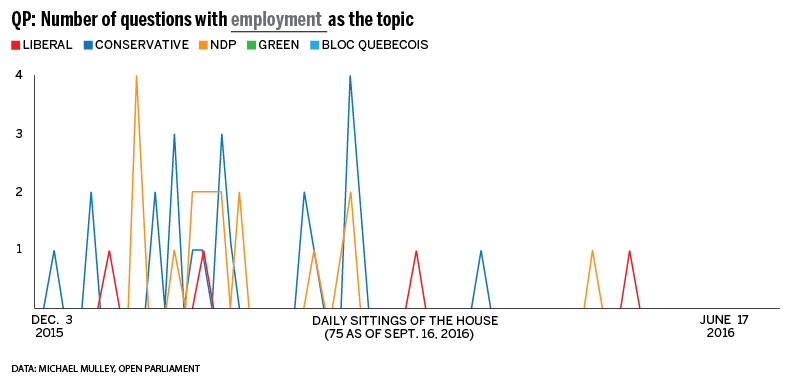
…but the New Democrats ask vastly more about employment insurance reform than any other party’s MPs.
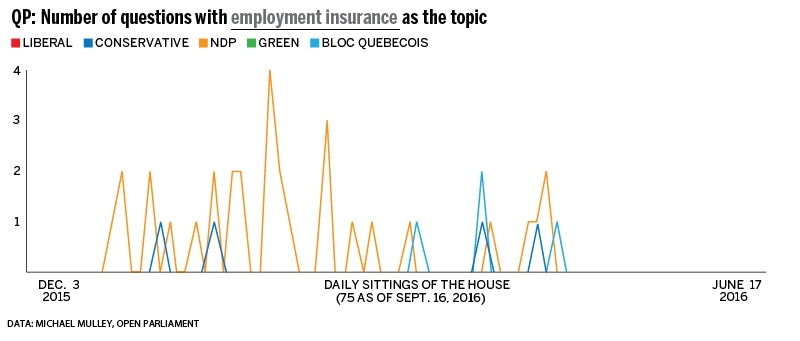
On Feb. 25, the NDP proposed three changes to the EI program that would repeal the former government’s reform, establish a universal qualifying threshold of 360 hours for workers, and limit the ways in which the EI account could be spent by government. The next day, NDP MP Peter Julian urged the government to accept his party’s ideas.
The response from Employment Minister MaryAnn Mihychuk is a familiar one for this government: “Mr. Speaker, we are in a process of Canadian consultation.” (The NDP motion was shot down on March 7.)
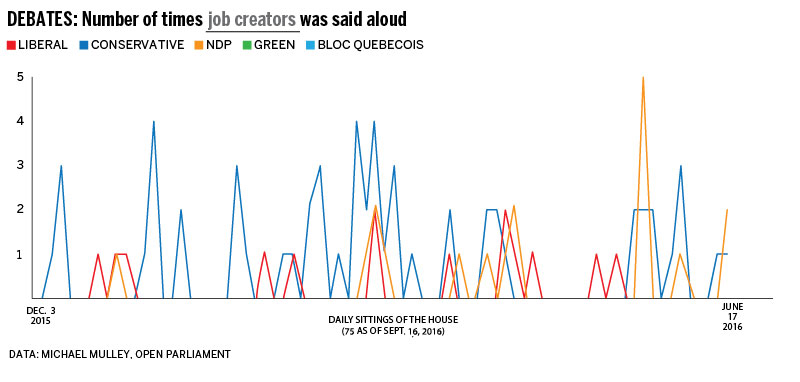
No one ever used to frame employers as “job creators”, in precisely that way, within the walls of Parliament. Between 2006 and 2009, for example, MPs only fused those words together 40 times. In 2010, the number jumped to 47; in 2011, 124; in 2013, a modern high of 134. The term’s origins may lie within the talking points of conservative Congressmen in Washington, D.C., who appeared to first lean on the pro-business phrasing in 2011. Indeed, it’s mostly Conservatives in our own House of Commons who first mimicked that style. But more recently, New Democrats who want to reclaim job creation for their own ends have jumped on the bandwagon.
On Feb. 5, 2015, a few months before the NDP hoped to form government for the first time, party finance critic Peggy Nash tabled a motion to “build a balanced economy, support the middle class and encourage manufacturing and small business job creation.” After a devastating election loss, the bipartisan trend continues; as recently as this past June, Conservatives and New Democrats were arguing about the best way to lend a hand to job crea—er, businesses who hire people.
5. Islamic State
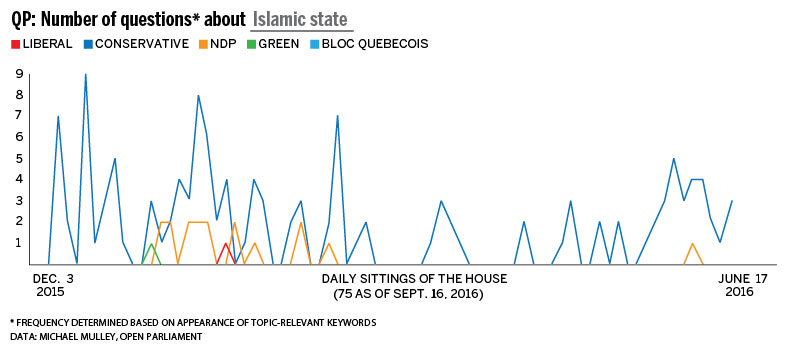
When Liberals vowed to remove CF-18s from an airstrike campaign in Iraq and Syria, and then followed through on that promise earlier this year, Conservatives were determined to oppose that move at every turn—and convince anyone watching question period that only one party was serious about ending ISIS’s reign of terror (even as the Liberals argued they’d only shifted priorities in the fight, not abandoned it).
Tories have repeatedly asked several rounds of questions a day on Islamic State, far exceeding any other opposition party’s commitment to anti-ISIS rhetoric—particularly in the session’s early months, as the Liberals still considered their options. All told, parliamentarians referred to ISIS and ISIL—two common references to the so-called Islamic State—more than 2,000 times since December. By comparison, they said economy or economic 6,135 times—and marijuana 802 times.
6. Syrian refugees
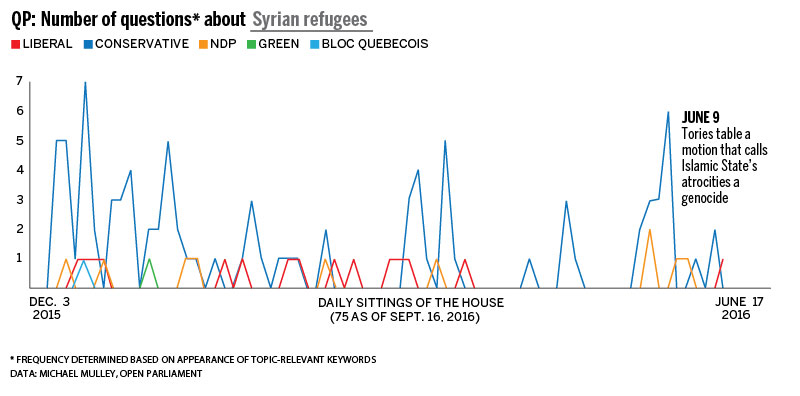
The other side of the fight Islamic State is, in part, Canada’s effort to accept thousands of Syrian refugees. Liberals campaigned on a promise to take in 25,000 Syrians before the end of last year. They moved the deadline back six weeks, but ended up hitting that number by the end of February.
Conservatives didn’t allow the Liberals any breathing room as the government grappled with its inability to meet an unrealistic deadline. During that first question period on Dec. 7, Tory MP Michelle Rempel asked Immigration Minister John McCallum “how many Syrian refugees have been identified for resettlement to Canada, the exact number, and how many Canadian permanent resident visas have actually been issued to Syrian refugees since November 4?” She concluded: “There are only 24 days left,” referring to the end of the year—and the Liberals’ self-imposed deadline.
RELATED: Where the first 25,000 Syrian refugees settled in Canada
After a few weeks on Ottawa’s back burner, Syrian refugees roared back into the debate on June 9 when Ambrose tabled a motion that called on the House to condemn ISIS’s atrocities as genocidal. The Liberals refused to use the G-word until a rigorous investigation concluded ISIS’s crimes constituted genocide. A week later, a UN investigation did come to that conclusion.